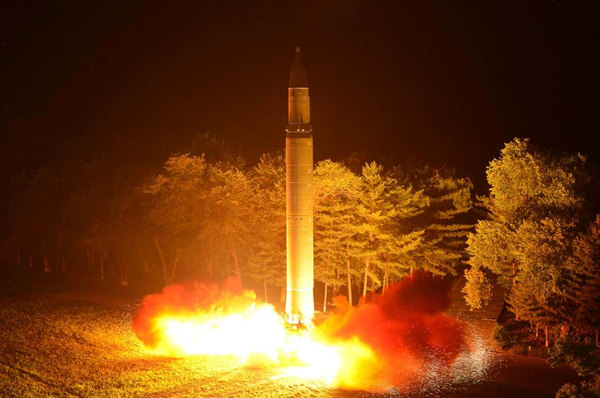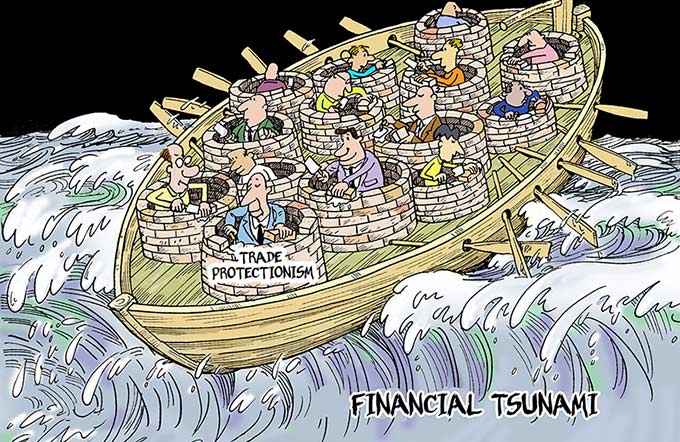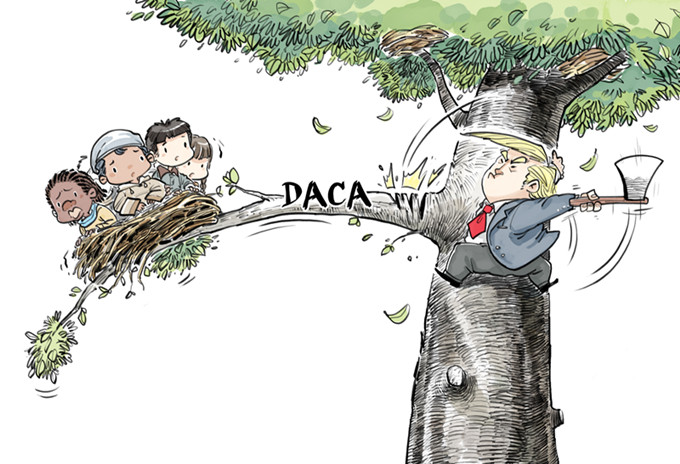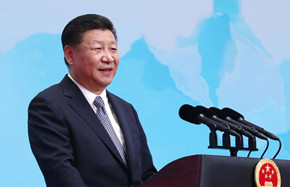UN action along with talks is the way to solve DPRK issue
 |
|
Intercontinental ballistic missile (ICBM) Hwasong-14 is pictured during its second test-fire in this undated picture provided by KCNA in Pyongyang on July 29, 2017. KCNA via Agencies |
The message was crucial, too, because it came at a time when the international community is racking its brain over how to respond to Pyongyang's latest, and most serious, nuclear provocation.
The last thing Beijing wants to see is a war-and the subsequent chaos and refugee exodus-which, besides raising security and humanitarian concerns, would exact an unbearable cost on China's Northeast, which is already struggling economically.
That Xi reiterated the belief that a long-term solution lies in dialogue and a "comprehensive" approach was only logical. And by highlighting Beijing's commitment to denuclearization and nonproliferation, Xi made it clear a nuclear-armed, saber-rattling Democratic People's Republic of Korea is as unacceptable as a war.
Since the almost unavoidable heavy civilian toll a military approach is widely believed to result in has made forcefully disarming Pyongyang a non-option, non-military means remains the only agreeable way to reason with the DPRK, and draw all the parties to the negotiation table.
China and Russia have proposed an ideal short-term tension-defusing solution: "dual suspension", meaning the United States and the Republic of Korea suspend their joint military drills in exchange for the DPRK halting its nuclear and missile adventure. The proposal is important because the concerned parties' deep-rooted mutual distrust, especially Pyongyang's belief in nuclear deterrence, could escalate tensions further leading to the catastrophic, yet avoidable, worstcase scenario-a military conflict.
Strong protests from Beijing and Moscow failed to stop Seoul and Washington from deploying the Terminal High Altitude Area Defense anti-missile system in the ROK. Four more launchers were installed in the wee hours of Thursday. Now, Seoul and Tokyo are considering introducing more powerful US "strategic assets", tactical nuclear weapons included. Should this pattern of escalation perpetuate, the resultant arms race in Northeast Asia could spiral out of control.
Of course, more efforts should be made to discourage Pyongyang from making fresh trouble. But, as China said on Thursday, while the United Nations should take more action against the DPRK, it should also push for dialogue, even the revival of the Six-Party Talks.
Perhaps the failure of even the severest sanctions to force Pyongyang to abandon its nuclear program suggests something the world seems to have missed: until the DPRK is assured there is no threat to its security, it will continue its, at times desperate, attempts to possess nuclear weapons as deterrence against the US. So, if the Six-Party Talks is the means to a long-term solution to the peninsula crisis, addressing the DPRK's security concern could be the start of that process.
- Xi, Merkel discuss Korean Peninsula
- US approach not helping situation on Korean Peninsula
- Xi urges restraint on Korean Peninsula nuclear issue in phone talks with Trump
- China calls on US, DPRK to refrain from escalating tensions on Korean Peninsula
- S. Korea, Japan leaders talk over phone on Korean Peninsula issues





















